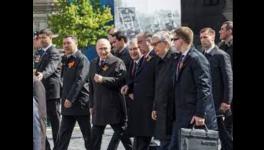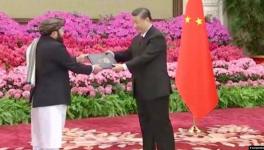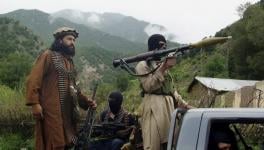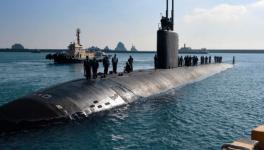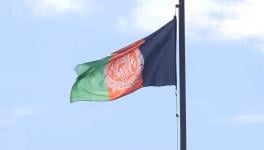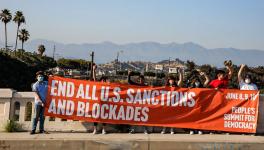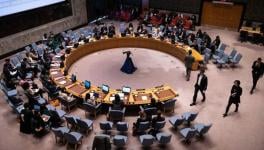Wilkerson on Afghanistan: The Longest U.S. War Will Go on for Decades
Colonel Lawrence Wilkerson, former chief of staff to Secretary of State Colin Powell, says geopolitics and the Taliban's military strength will help keep U.S. troops in Afghanistan for decades to come.
Lawrence Wilkerson is a retired United States Army soldier and former chief of staff to United States Secretary of State Colin Powell. Wilkerson is an adjunct professor at the College of William & Mary where he teaches courses on US national security. He also instructs a senior seminar in the Honors Department at the George Washington University entitled "National Security Decision Making."
Rough Transcript
Aaron Mate: It's 'The Real News,' I'm Aaron Mate. Afghanistan is the longest US war, and it's deadlier than ever. The new US government report says the toll for Afghan civilians and military forces last year was the highest on record. The violence forced more than 660,000 people to flee their homes, also the most to date. US generals have requested thousands of additional troops. In a recent interview, national security advisor, H.R. McMaster hinted at a looming escalation.
H.R. McMaster: This is really the modern day frontier between barbarism and civilization. With those high stakes in mind, recognizing that the Taliban groups that we're fighting here, that the ISIS groups that we alongside, really the Afghan forces are really fighting and we're just enabling them in the Eastern part of the country, are a threat to all civilized peoples.
Aaron Mate: The Taliban is said to control at least one-third of Afghanistan, more than 15 years after the US invasion. A recent Taliban attack on an Afghan base was one of it's worst to date, killing some 160 Afghan soldiers. The violence could only rise as the spring fighting season begins. Joining me is Colonel Lawrence Wilkerson, former Chief of Staff to Secretary of State, Colin Powell; now a distinguished professor at the College of William and Mary in Virginia. Colonel Wilkerson, welcome back.
Col. Wilkerson: Good to be here.
Aaron Mate: We have talk now of President Trump sending more US troops back to Afghanistan at the rest of it's generals. What amazes me about this discussion is that it wasn't too long ago, in 2011 at the height of President Obama's surge, we had 100,000 US troops there. That wasn't sufficient to beat the Taliban, so now with about 9,000 troops, there's talk of sending a few thousand more; as if that could somehow make a difference. What do you make of what is this never ending US war in Afghanistan, almost 16 years old?
Col. Wilkerson: The first thing I make of it is that I've heard this before. I guess I'm getting too old. I've heard generals ask from foreign theaters for more troops, enough times to know that none of them have succeeded with those more troops; and that it seems to be the only thing that generals know how to ask for, more troops. That said, the situation in Afghanistan is truly bad. It's probably as bad as it has been in the past 16 years. The Taliban, as you indicated, control more territory now probably than they have at any time since the inception of the conflict, when they more or less were the government of the state of Afghanistan. It's looking pretty bad.
That said, I think the strategic rationale for staying in Afghanistan is shifting. Let me back up just a moment and say that if it is going to shift, then the major impediment to what has been, according to the generals, the problem in Afghanistan, too few troops, is going to be exacerbated majorly. We simply do not have enough troops to do all these brush fire wars, these peripheral empire wars. We just don't have enough troops. If we're going to do these things, and we're going to do them more effectively, we'd better think about conscription, or at least a much larger armed force than we have. Given recruitment details of late, there's no way we could recruit an all volunteer force of that size, so as I said, we probably need to be thinking about conscription.
All of that to say that I think the strategic rational has shifted, I think we're staying in Afghanistan for the next 50 years. The reason I say that is because Afghanistan presents us with the only opportunity, land opportunity, territory opportunity upon which to put US forces that can, at any given time that they desire to, that the president orders it, interdict, interfere with, or give the Chinese some trouble with their one belt, one road theory; essentially building a new silk road from Xinjiang Province all the way through the region and up into Europe.
The only way the United States can impact that with hard military force would be from a position somewhere along that route. We discovered, with regard to the Eastern Mediterranean in Afghanistan, for example, that it's extremely difficult, if not well nigh impossible to do it out of the Eastern Mediterranean with naval air forces and air forces. I don't see that we are going to leave Afghanistan if this is indeed the shifting strategic rationale any time soon.
Aaron Mate: Okay, so this is a reasoning that is not mentioned, if ever mentioned, as a reason for the US being in Afghanistan. You're saying that it is not linked to Taliban control of Afghanistan, and their original harboring of Al Qaeda, but actually US designs when it comes to China. When you served under the Bush administration, back in 2001 when this invasion was launched, was China a consideration back then?
Col. Wilkerson: China was a consideration only in the sense that we knew we were getting very close. After all, we'd had an experience with getting close to the Chinese border when we ran Korea in '50, you may recall. The Chinese entered with 300,000 volunteers. Situations changed a lot, but we were somewhat concerned about having a border with China, and being in Afghanistan, that features that border. People looking at it at that time made sure that the Chinese knew that we were not going to linger. Well, we've lingered for 16, almost 17 years now. We're looking at a whole different tapestry of possibilities now, too. We're looking at the possible Israeli now financed I understand largely by people like Goldman Sachs. Wow, wonder why Donald Trump has Goldman Sachs in the White House. Pipeline, running up from.
Aaron Mate: Well, wait a second, Colonel Wilkerson. Are you suggesting that Goldman Sachs being in the White House is somehow linked to the Israeli government's financial ties to Goldman?
Col. Wilkerson: How in the world would anyone ever not think that? I mean how could I be so naïve to think that I don't believe Goldman Sachs is connected in some way to the leadership in Israel, and the Israeli leadership connected to Goldman Sachs?
Aaron Mate: Well, that may be true, but that doesn't mean that, that's why Trump has them in the White House. I mean it could just be, as many administrations have close ties to Wall Street, Trump is just following that trend; certainly as a billionaire with a lot of billionaire friends, that's not very implausible.
Col. Wilkerson: Oh absolutely, absolutely. President Obama, President Bush, everybody has Goldman Sachs in the White House, whether it's Bob Reuben, the most powerful member of Clinton's administration, or it's Larry Summers, or whomever. We always have Goldman Sachs in the White House, as it were. That's how influence is exerted. You stopped me as I was trying to tell you about the pipeline coming out of Israel and going up into Europe. The pipeline coming out of Iran, and going ostensibly into Europe. The old TAPI pipipeline, the Turkmenistan, Afghanistan, Pakistan, and India.
There are so many pipelines running across there at the tune of billions and billions of dollars in investment and potential investment, and ultimate profit, that one boggles when one looks at a map at what's happening in this area both East, West, and North and South now. It's very difficult for me. Now, I have to realize that we don't have too many strategic thinkers in the White House, nor apparently anymore do we have too many in the Pentagon. If there are any, they've got to be looking at things like this.
They got to be looking at Afghanistan and saying, "Voila! Look what we have here. We have a place where we have military forces in the middle of all of this." If I were a military professional and I saw that, I don't believe I'd be recommending to the Commander in Chief that we remove those military forces any time soon.
Aaron Mate: Okay, let me put you the conventional reasons that we hear for arguing against the US withdrawal. It's said that now we don't just have the Taliban, but there's also the remaining Al Qaeda forces in Afghanistan. Now we also have ISIS with a foothold there, especially on the border with Pakistan. We also have the Haqqani network, another militant group. Then, there's the central argument also that if the US withdraws, it's feared that, that would destabilize Pakistan. How do you address those issues?
Col. Wilkerson: Those are all serious issues. Of course, had we not invaded Iraq in March of 2003, all of that would probably be a hell of a lot lesser level than it is right now. I read an analysis, I believe it was by the Soufan Group recently, where we had so many thousands of Al Qaeda, for example, in the world immediately after 9/11, and now we have so many more thousands of them. We have all kinds of other organizations, too, like Abu Musab al-Zarqawi's ISIS, which came out of Iraq, and the Al Qaeda. The policies of the United States have indeed created lots more problems in the world, particularly problems with burgeoning and growing terrorist groups, who are burgeoning and growing on account of our policies with regard to them.
So yes, but I would not look at that except as a tactical issue. Bad, got to be dealt with, of course; but it's a tactical issue. The strategic issue, the issue of trillions of dollars, the issues of two clashing economies, the issues indeed of the two giants of the world, the United States and China, criss-cross nicely in Afghanistan; and Pakistan, who happens to be ostensibly a US ally that seems more often a Chinese ally than it does US. Yes, your point is well taken, but I pull it up into the grand strategic issues, rather than the tactical issues and say this is all about the great game. The great game used to be Russia and England, and so forth. The great game is now the United States and China.
Aaron Mate: You mention Pakistan being a Chinese ally. There are elements in Pakistan that are also closely tied to the Taliban. The Taliban itself, as a foe, as a US foe, now they did harbor Al Qaeda but aside from that, correct me if I'm wrong, but they do not pose an international terrorist threat. They don't attack people abroad, as far as I know. Is there a possibility of making peace with them right now in Afghanistan with them controlling so much territory, and this war just never seeming to end?
Col. Wilkerson: I think I'd be moving that way if I were the United States and I had a brain. I'd be moving that way, because as I said, this is a much bigger game than just these regional terrorist groups, or even as you say, terrorist groups with a global capability. Which, to this point, has only been Al Qaeda. I say that because you're looking at a nuclear country in Pakistan. You're looking at a nuclear country in India, and of course, China. You're looking at the intersection of all the interests of these countries, plus the imperial power, the United States, all coming to bear right there.
You've got India and Pakistan still not settled, in terms of the main issues between them. You've got Pakistan supporting the Taliban to per debate Afghanistan because that gives India heartburn. You've got Kashmir, again, bubbling a little bit. You've got Modi in India and what he's done to stabilize India; but the problem between the Muslims and the Hindus in that country. You've got India as a major, shall we say bulwark against China. More and more are closely associated with the United States; particularly, it's navy.
You've got all these powers aligning themselves from time to time in different ways, but basically, laying themselves down as China versus the United States; and the others having to choose from time to time which side diplomatically or otherwise they'll be on, on any given issue. It's all about power. It's all about grand strategic power. Frankly, these terrorists are insignificant to that. They're a problem. They're a problem that has to be dealt with by all of those countries in the region. Rashkari Kayaba, for example, in Kashmir. They're not the grand strategic problem that the interstices and the interplay of all these great powers and near great powers in the region are.
Aaron Mate: Now, on the issue of foreign powers in Afghanistan, I want to play for you the comment of General John Nicholson, the Commander of US forces in Afghanistan. He recently suggested that Russia is now arming the Taliban. This is what he said.
John Nicholson: We continue to get reports of this assistance, and of course, we have the overt legitimacy lent to the Taliban by the Russians, that really occurred late last year, beginning through this process they've been undertaking.
Reporter: You're not refuting that there's any weapons.
John Nicholson: Oh no, I'm not refuting that.
Aaron Mate: Colonel, there's a certain irony here, whether or not the charge is true or not; because in the 80s, we all remember that it was the US that waged sort of this proxy fight against Russia through support of the forces that eventually became the Taliban ... Drawing Russia into this long, protracted war inside Afghanistan that lasted about ten years. Now the US is inside Afghanistan as an occupying force of it's own, has been there even longer. It's been there 15 years. Now, we have the US accusing Russia of arming the Taliban, who the US long ago armed to weaken Russia.
Col. Wilkerson: You just named the great game. The partners change, the side fluctuate a bit, but the great game goes on. If I were to ... I'm not saying that I believe General Nicholson. I'm not saying that I believe that the Russians are arming the Taliban, but if I were Moscow, I would be arming the Taliban. I would be turning the tables on the other empire in the world, the United States. I would be doing it for good reasons, good, solid, strategic reasons because the United States is in Afghanistan. That's very close to my borders. I don't like the United States in Afghanistan. I don't like it in Georgia. I don't like it in Ukraine. I don't like it in Latvia, Estonia, or Lithuania, either. This is all about power. It's about strategic power. If I were Moscow, I would be arming the Taliban against the United States in Afghanistan in an effort to get the United States out of Afghanistan.
Aaron Mate: Okay, so I'm sorry to end on this grim note, but you've mentioned all these different foreign powers and their [inaudible 00:15:44] inside Afghanistan. You mentioned you thinking that the US will be there for decades to come. What does this mean then for the people of Afghanistan?
Col. Wilkerson: As with the people of all the satellite countries that the United States and the Soviet Union, they then to contesting imperial powers, per debated with their proxy wars and everything, probably the same thing. I mean I recall Central Africa, I recall Angola, I recall Laos, Cambodia, Vietnam, Southeast Asia in general, South America, El Salvador, Nicaragua, Honduras. These are places where the great powers play in their proxy wars. It's all shifted now. Not completely, of course. There's still some things going on in other places, too, like Yemen.
It shifted and it's major focus now, instead of being in South America, in Africa, or wherever, it's major focus is right there in Central Asia on the old silk road, if you will, and the contestation between some fairly formidable powers: China, India, Russia, the United States. This is history. It's happening. It's about real power interests. It's about real economic and financial interests. It's going to go on. We use terrorism as an excuse to be places or to do things when in fact, it has very little to do with terrorism and everything to do with great power, economics, and the finances associated with that great power.
Aaron Mate: Colonel Lawrence Wilkerson, the former Chief of Staff to Secretary of State, Colin Powell, now a professor at the College of William and Mary. Colonel, thank you as always.
Col. Wilkerson: Thanks for having me.
Aaron Mate: Thank you for joining us on 'The Real News.'
Get the latest reports & analysis with people's perspective on Protests, movements & deep analytical videos, discussions of the current affairs in your Telegram app. Subscribe to NewsClick's Telegram channel & get Real-Time updates on stories, as they get published on our website.









